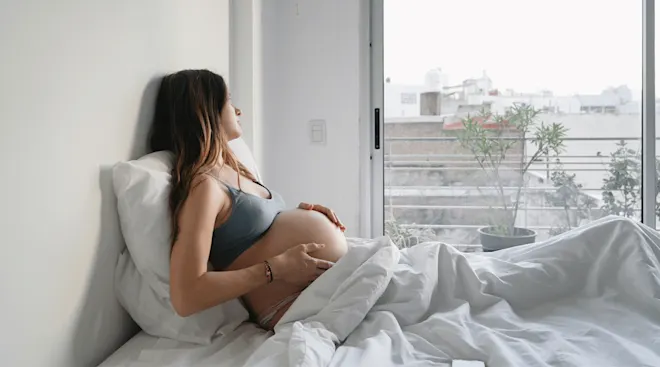Pregnancy Insomnia: Why You Can’t Sleep—and Tips to Get More Zzz's
Your pregnant body is going through a lot of changes and doing some pretty marvelous work—after all, growing a baby is no small feat! It’s no wonder you need extra rest during this tiring time. The irony, of course, is that it can be hard to get a good night’s sleep right when you might need it most. “I’m lucky if I can get so many hours of broken sleep. I’ve tried not napping during the day but that makes me more restless at night,” shares The Bump community forum member Cebs222,
Pregnancy insomnia can happen at any point while you’re expecting and is attributed to several factors, including hormonal shifts, intensifying pregnancy symptoms and, most obviously, a growing baby bump. Thankfully, you don’t have to spend those nine+ months restlessly tossing and turning. We turned to experts to find out why insomnia during pregnancy happens, when to expect it to hit the hardest and how to keep it in check, so you can finally get some shuteye.
- Pregnancy insomnia is common, affecting around 78 percent of expecting women.
- It’s caused and exacerbated by many common prenatal symptoms, including hormonal changes, nausea and heartburn.
- It can start at any point in pregnancy, but is most common in the third trimester.
- Pregnancy insomnia can be managed with key lifestyle changes, such as having a healthy bedtime routine, limiting late-night snacks and reducing stress.
Pregnancy insomnia is the inability to fall or stay asleep while pregnant, says Rebekah Mustaleski, CPM-TN, a certified professional midwife and compression director with Motif Medical. If you’re having trouble falling asleep, staying asleep or waking up frequently in the middle of the night, odds are you’re dealing with insomnia while pregnant—and you’re not alone. According to the American Pregnancy Association, though frustrating, insomnia during pregnancy is completely normal and affects around 78 percent of expectant women. It tends to impact moms-to be most in their first and third trimesters due to hormonal changes, Mustaleski says.
If you mention it to anyone they just say, 'Oh wait until you have your baby—talk about no sleep.' But it's so different… It was way worse when you can’t sleep while pregnant and you’re so uncomfortable. And you don't have your baby to hold yet!
While discomfort from a growing baby bump may be one obvious cause of insomnia during pregnancy, Mustaleski explains there are many other pregnancy symptoms that contribute to trouble sleeping, including:
- hormonal fluctuations
- nausea
- frequent trips to the bathroom
- leg and back pain
- heartburn
- anxious thoughts
Pregnancy insomnia is also often exacerbated by poor sleep hygiene. “Exposure to screens right before bed and lack of a bedtime routine” aren’t doing you many favors, says Rachel Mitchell, a certified maternity sleep consultant and founder of My Sweet Sleeper. (More on this below!)
I can go to sleep anytime, anywhere. But once bedtime hits, I fall asleep for about two to three hours and wake up about every two hours after that. After I get up to pee, I have issues falling back asleep. I hate it… But I’m just telling myself it's good practice for when baby comes! I just wish I could just get some good sleep for the last weeks before he gets here.
Pregnancy insomnia can start at any point after conception, Mitchell says, but it typically peaks in the later half of pregnancy, once symptoms intensify. However, Mustaleski says some women may start to experience insomnia during pregnancy as early as 6 to 7 weeks in. Exactly when you’ll start tossing and turning ultimately depends on the causes—and these will change as your pregnancy progresses.
Insomnia in early pregnancy
Early pregnancy insomnia is primarily caused by the shift in hormones and the symptoms women experience as a result, such as nausea, vomiting and increased urination. All of this disrupts the body’s regular sleep and wake cycles, Mustaleski says. For this reason, insomnia in early pregnancy may affect a woman’s ability to stay asleep more than her ability to fall asleep. “You might fall asleep easily enough when you go to bed, only to be laying awake staring at the ceiling a couple of hours later,” she says. “It can take some time for your body to adjust.”
Insomnia in late pregnancy
Pregnancy insomnia in the third trimester is often associated with discomfort due to intensified pregnancy symptoms or anxiety surrounding baby’s arrival. “It gets more difficult to find comfortable positions, and the weight of baby can make your back and hips ache at night,” Mustaleski says. Plus, some moms-to-be may also lay awake at night worrying about the many unknowns of labor, wondering how it will go. “Anxious thoughts have kept many a pregnant mom awake at night,” Mustaleski says.
Unfortunately, pregnancy insomnia can last the entire nine+ months, but it “may also come and go in waves,” Mitchell says. Some good news: Even if you struggle with sleepless nights in the first trimester, it’ll likely improve by the second, Mustaleski says, thanks to more stabilized hormones.
When it comes to the third trimester, most pregnant women do have trouble sleeping. “The more baby and your belly grows, the harder it is to get comfortable, turn over and sleep soundly for more than a couple hours at a time,” Mustaleski says. “Add in a bladder that needs to be emptied frequently, and you can see how sleep becomes more difficult at the end.”
I've found that getting any sort of workout (however mild) in during the day, preferably walking, really helps. I have a mattress topper and Snoogle for my hips, which have helped since the beginning of my second trimester. If I really can't fall back asleep, I watch an episode of a show or read a few chapters of a book to take my mind off things, and attempt to sleep again in an hour or so.
While pregnancy insomnia may not go away completely, there are ways to help keep it under control and up your comfort at night. Both experts agree the primary focus should be on making certain lifestyle changes and developing healthy sleep habits. “It’s important to reserve your room and bed for sleep and sex only,” Mitchell says. “Many of us watch TV and do work in our rooms, but we want the bedroom to be for these two things only, so the body and mind can make healthy associations with sleep.” Keep reading for more ways to manage pregnancy insomnia.
Develop a healthy bedtime routine
You’ve heard this one again and again, but a big part of good sleep hygiene is developing a healthy bedtime routine. “It helps your body to relax and fall asleep if you do the same thing every night to let your mind and body know what’s coming,” Mustaleski says. “Try to be consistent with your bedtime routine, even when you’re away from home.”
As part of this, limit screen time an hour or two before bed—there’s a lot of evidence to back up how this improves sleep. “Blue light exposure suppresses melatonin and can increase cortisol levels before bed, which is the opposite of what we want to happen in the evening,” Mitchell says. Instead of turning on the TV or scrolling on your phone, try doing some light reading, an evening meditation or an Epsom salt soak before bed.
Mind your dinner and late-night snacks
Pay attention to when and what you eat for dinner, taking care to avoid anything that triggers uncomfortable symptoms like heartburn, which can be a big pain point in the third trimester. Stay away from foods with caffeine, processed sugar and a lot of spice, Mitchell suggests. In fact, you may want to cut the caffeine entirely after lunch. “While it might seem like there’s enough time for it to get out of your system, many people have trouble falling asleep or staying asleep if they have caffeine in the afternoon or evening,” Mustaleski says.
In terms of when to eat, Mustaleski recommends at least three hours before bed so the body has enough time to digest. If you do get hungry afterward, stick with snacks low in sugar and high in protein. “Protein snacks will help keep your blood sugar balanced throughout the night and keep you from waking up hungry in the middle of the night,” she explains.
The pillow—a gift to all pregnant women! I just purchased a maternity pillow and it's like sleeping on a cloud.
Move your body and calm your mind
Prenatal workouts offer tremendous benefits, including limiting the risk of gestational diabetes and helping build strength for labor. They can also help ease anxious thoughts and improve sleep! Mitchell recommends pregnant women get at least 30 minutes of exercise each day. An easy way to do this is to go for a walk after dinner—not only will this get you up and moving, but it also helps get baby into a good position and prepares the body for labor, Mustaleski says. You may consider practicing prenatal yoga or stretching before bed as well, as it relaxes the body and mind, she adds. Pay attention to your shoulders, back, legs and calves to help avoid cramps.
To ease anxiety around baby’s arrival and upcoming parenthood, Mitchell recommends meditating or keeping a journal next to your bed to unload your thoughts. If you’re still feeling overwhelmed and find that your anxiety is taking over your pregnancy, reach out to a professional for help.
When I actually get to bed, I like to contract and relax my arms and legs for a minute or two. That relaxes them…Then I breathe in long, soft and easy breaths. That's my recipe for good sleep.
Frequently Asked Questions
Is Insomnia a sign of pregnancy?
Both experts agree that, while insomnia can be a sign of early pregnancy, it’s not one of the first ones people notice. Pregnancy insomnia usually occurs later on, once other pregnancy symptoms have already presented themselves, says Mitchell.
Wondering if insomnia can be the first sign of pregnancy? “Changing hormone levels are frequently thought to cause pregnancy insomnia, and they start climbing as soon as the egg is fertilized,” Mustaleski explains. So, yes, it’s possible that insomnia during pregnancy may be the first sign of early pregnancy for some women—though you probably won’t realize it was until after the fact.
Can insomnia in early pregnancy predict baby’s sex?
You may have heard the myth that if you experience pregnancy insomnia, you’ll give birth to a baby girl. But don’t be too quick to believe this—the claim isn’t backed by facts or research. “Most of the old wives’ tales about [sex] prediction have to do with how the body responds to the increased hormone levels during pregnancy,” explains Mustaleski. “What I’ve found to be true is that these hormone fluctuations affect everyone differently.” While one woman might crave sweet treats, another might want salty snacks. Similarly, while some women may be more bothered by insomnia during pregnancy, others may have no problem sleeping, regardless of the sex of their baby; it’s just a matter of how your individual body reacts.
Safe to say, if you’re suffering from insomnia while pregnant, don’t assume it means you’re carrying a baby girl. Keep in mind, there are much more reliable ways to find out baby’s sex.
Can I take melatonin for pregnancy insomnia?
According to Mustaleski, there isn’t definitive evidence and research proving how safe melatonin is during pregnancy. “Definitely talk to your healthcare provider before taking melatonin to help you sleep,” she says.
Can I take prescribed sleep medication for pregnancy insomnia?
While some over the counter medications, such as Unisom, may be safe to use in pregnancy, it’s best to check with your provider before taking any over-the-counter or prescription sleep medication for pregnancy insomnia, Mustaleski says.
Can pregnancy insomnia harm baby?
Pregnancy insomnia won’t directly affect baby, but a severe lack of sleep may contribute to pregnancy complications. “Sleep deficiencies are correlated with increased blood pressure, decreased metabolism and decreased immune function,” Mustaleski notes. “Add to that the fact that pregnancy is a time when the cardiovascular system is working harder, and the immune system is already compromised, it will be no surprise that inadequate sleep can play a role in gestational hypertension, preeclampsia and gestational diabetes.”
In which trimester of pregnancy is lack of sleep the most common?
Per Mustaleski, it’s most common to have sleep disturbances in the third trimester for a number of reasons: “Your hormone levels are at their highest, you have fewer positions to comfortably sleep in, your low back and hips can be sore from the pressure of baby and you’re getting up to go to the bathroom every couple of hours.”
Do rising hCG levels cause pregnancy insomnia?
While hCG may not directly cause pregnancy insomnia, it may lead to factors that do. The hCG hormone increases progesterone levels, which relaxes muscles and increases uterine pressure on the bladder, Mustaleski explains. Consequently, this may lead to more frequent urination at night, which disrupts sleep. “In a way, you could say that it does cause pregnancy insomnia,” she says.
Does pregnancy cause strange dreams?
Thanks to your shifting hormone levels, you’ll likely notice you’re having more strange dreams in pregnancy. “If your dreams are troubling, practicing mindfulness, gratitude or meditating before bed can help balance your nervous system and prevent disturbing dreams,” Mustaleski says.
Experiencing insomnia while pregnant is incredibly common as a result of all the hormonal changes your body is going through. But no matter how you slice it, pregnancy insomnia can be very frustrating—after all, pregnancy brings on fatigue, but “even though you may feel very tired, you may not be getting restorative sleep,” Mitchell says. If the above methods aren’t offering enough relief and you find yourself lying awake most nights, reach out to your healthcare provider. They’ll be able to offer tips for your specific circumstances or put you in touch with a sleep specialist who can help. Hang in there! Baby’s arrival is going to make it all worth it.
Please note: The Bump and the materials and information it contains are not intended to, and do not constitute, medical or other health advice or diagnosis and should not be used as such. You should always consult with a qualified physician or health professional about your specific circumstances.
Plus, more from The Bump:
Rachel Mitchell is a Boston-based certified maternity and pediatric sleep consultant, former night nanny and mom to seven. She is the founder of My Sweet Sleeper, a team of maternity and pediatric sleep specialists that help growing families get some much needed shut-eye, as well as the founder of Sweet Sleep Academy, a pediatric sleep consultant program.
Rebekah Mustaleski, CPM-TN, IBCLC, is a certified professional midwife specializing in evidence-based maternity care. She co-founded Roots & Wings Midwifery in Knoxville, Tennessee. Mustaleski received her bachelor’s degree in psychology from Centre College and worked as a doula and birth photographer prior to establishing Roots & Wings.
American Pregnancy Association, Pregnancy Insomnia: Snooze Or Lose!, 2023
Journal of Clinical Sleep Medicine, Bedtime screen use in middle-aged and older adults growing during pandemic, December 2020
Real Parent Perspectives: Cebs222 doremi29 ashleyrazo morganelizabeth23 awrightk21 cken
Learn how we ensure the accuracy of our content through our editorial and medical review process.
Navigate forward to interact with the calendar and select a date. Press the question mark key to get the keyboard shortcuts for changing dates.





















































